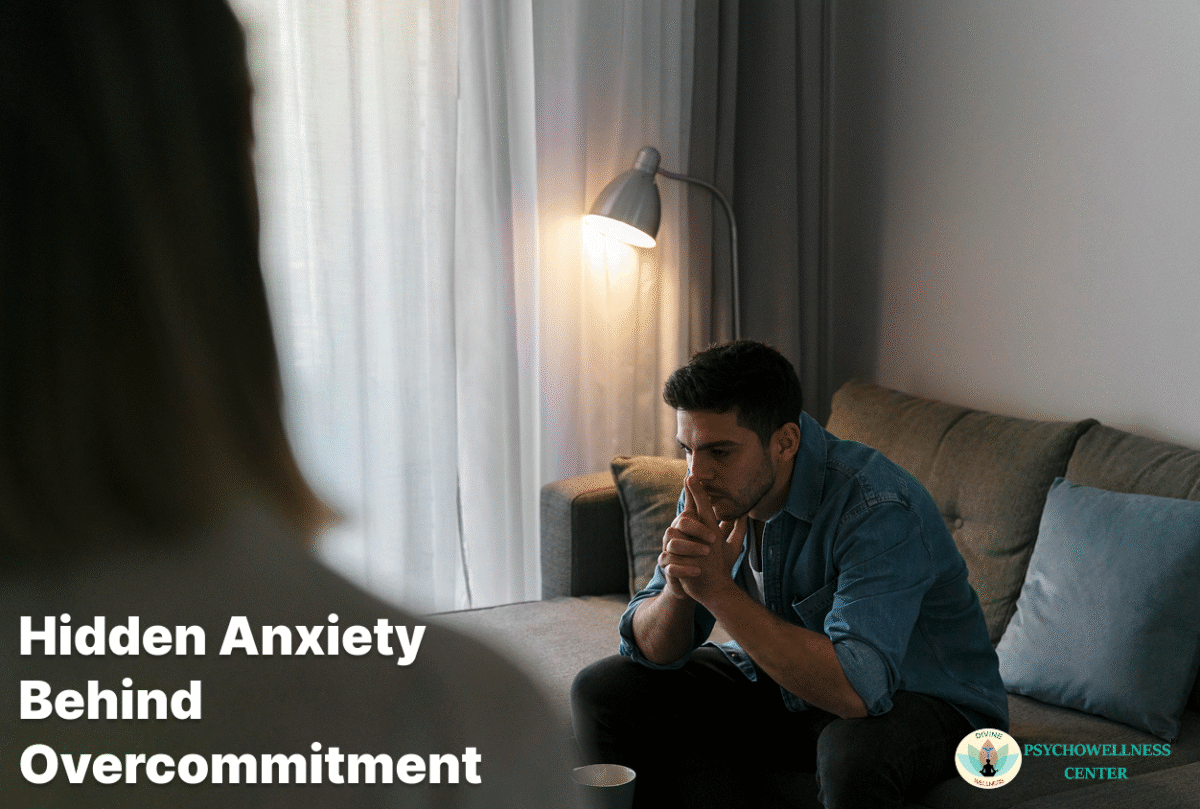Ever looked at your to-do list and felt anxiety just by seeing how much you’ve promised to do? That’s the grip of overcommitment, taking on more responsibilities, tasks, or obligations than you can realistically handle. Overcommitment appears in workplaces, academics, relationships, or friendships, often disguised as helpfulness or ambition. While it may seem admirable, its consequences run deep: physical and emotional exhaustion, burnout, and intense anxious thoughts. These, in turn, spill over into emotional dysregulation, reduced satisfaction, and strained relationships, fostering guilt, resentment, and frustration.
The Anxiety Behind Saying “Yes”
Fear of Failure or Rejection
Imagine this: after a long day managing six demanding tasks, a friend calls and asks for help moving over the weekend. Rationally, you’d say no, but overcommitters think: “If I say no, they’ll think I’m selfish.” “I don’t want to disappoint them.” The immediate anxiety of relational rejection feels more urgent than long-term stress. This fear stems from high personal expectations, a need for social acceptance, and a worry of judgment or rejection. Though these fears feel real, they are usually irrational, driving commitments that lead to distress and burnout.
The Illusion of Control
Some overcommit to regain a sense of control over life’s uncertainties. Staying busy can temporarily distract from distressing situations, but overcommitment often compounds stress. The mental load of unfinished tasks adds to the original anxiety, creating a cycle where busyness is mistaken for control.
Fear of Being Unworthy
For many, self-worth is tied to productivity. This hidden anxiety drives overcommitment as a frantic effort to prove value, to bosses, friends, or oneself. In this mindset, a packed schedule is a badge of honor, not a sign of stress. Saying “no” feels risky, as it could signal irrelevance or inadequacy. Hustle culture amplifies this, presenting superhuman standards of success that make rest seem like failure. Overcommitters are trapped in a loop: anxiety drives overcommitment, which leads to exhaustion, failure, and even more anxiety.
Breaking the Cycle
Breaking free from overcommitment involves a combination of self-awareness, boundary setting, and therapeutic strategies:
- Identify Core Anxiety – Understanding the specific fear driving overcommitment (e.g., fear of rejection, inadequacy, or failure) helps address the root cause rather than masking it with busyness.
- Implement the Pause – Use strategies like the “24-hour rule” to pause before committing. This allows rational reflection and prevents emotional hijacking that leads to automatic “yes” responses.
- Redefine Self-Worth – Separate personal value from productivity. Prioritize time and energy according to values (family, health, personal growth) and accept imperfection on non-critical tasks.
- Master the Intentional “No” – Saying no while maintaining relationships is key. Offer alternatives, communicate priorities, and protect personal capacity without guilt.
Therapeutic approaches can enhance this process:
- Cognitive Behavioral Therapy (CBT): Helps recognize and restructure anxious thoughts that drive overcommitment (Hofmann et al., 2012).
- Mindfulness-Based Stress Reduction (MBSR): Cultivates awareness of internal stress triggers and improves emotional regulation (Kabat-Zinn, 2003).
- Acceptance and Commitment Therapy (ACT): Encourages acceptance of limits, clarifying values, and committing to intentional actions (Hayes et al., 2011).
- Family Therapy: Supports relational boundaries, communication, and shared responsibilities within households, reducing external pressures that exacerbate overcommitment (Nichols & Davis, 2020).
Cultivating Long-Term Resilience
Breaking free from overcommitment is not just about saying “no” in the short term; it’s about cultivating long-term emotional resilience. Developing self-awareness through reflective practices such as journaling, mindfulness, or group therapy can help you recognize early warning signs of stress and anxiety before they escalate. Building supportive social networks, delegating responsibilities, and celebrating small achievements rather than overloading yourself with unrealistic goals also strengthen resilience. Over time, these habits create a sustainable balance between productivity and well-being, allowing you to honor your commitments without compromising your mental health, relationships, or sense of self-worth.
Conclusion
Overcommitment is not a badge of honor, it is hidden anxiety manifesting as a frantic attempt to gain control, acceptance, and worth. While saying “yes” may temporarily ease relational fears, it ultimately amplifies stress, guilt, and burnout. True strength lies in confronting the anxieties driving overcommitment, honoring priorities, setting boundaries, and practicing self-compassion. Your value is intrinsic, not earned through constant busyness. Choosing peace over panic and intention over obligation is the ultimate demonstration of personal and emotional strength.
Professional Support for Families
For families striving to create a more supportive, calm, and emotionally secure home environment, the Psychowellness Center in Dwarka Sector-17 and Janakpuri, New Delhi (011-47039812 / 7827208707) offers professional guidance through family counseling, parenting therapy, stress and anxiety management, mindfulness-based interventions, CBT-based emotional regulation training, behavioral modification for children, and communication skills development. Their multidisciplinary team works with parents, children, and adolescents to strengthen emotional safety, establish healthy routines, improve boundaries, and foster stronger family connections.
For flexible, online support, TalktoAngel provides access to experienced top psychologists specializing in family dynamics, parenting challenges, emotional resilience building, conflict resolution, and mental health education. Their services help families transform their homes into nurturing, mentally healthy spaces that promote well-being, stability, and long-term emotional growth.
Contribution: Dr. R.K. Suri, Clinical Psychologist, and Ms. Charavi Shah, Counselling Psychologist
References
Hayes, S. C., Strosahl, K. D., & Wilson, K. G. (2011). Acceptance and commitment therapy: The process and practice of mindful change (2nd ed.). Guilford Press.
Hofmann, S. G., Asnaani, A., Vonk, I. J., Sawyer, A. T., & Fang, A. (2012). The efficacy of cognitive behavioral therapy: A review of meta-analyses. Cognitive Therapy and Research, 36(5), 427–440. https://doi.org/10.1007/s10608-012-9476-1
Kabat-Zinn, J. (2003). Mindfulness-based interventions in context: Past, present, and future. Clinical Psychology: Science and Practice, 10(2), 144–156. https://doi.org/10.1093/clipsy/bpg016
Nichols, M. P., & Davis, S. D. (2020). Family therapy: Concepts and methods (12th ed.). Pearson.
https://www.psychowellnesscenter.com/Blog/exiting-from-the-loop-of-anxiety-and-overthinking/
https://www.psychowellnesscenter.com/Blog/strategies-to-stop-overthinking/
https://www.psychowellnesscenter.com/Blog/habits-that-quietly-hamper-gen-z-lives/
https://www.psychowellnesscenter.com/service-anxiety-treatment-in-delhi/
https://www.psychowellnesscenter.com/Blog/building-resilience-and-hope-in-high%E2%80%91stress-jobs/
https://www.talktoangel.com/blog/students-in-fashion-colleges-mental-health-issues-and-solutions
https://www.talktoangel.com/blog/how-can-i-stop-overthinking

